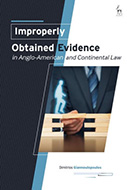Improperly Obtained Evidence In Anglo-American And Continental Law

Author: Dimitrios Giannoulopoulos
Publisher: Oxford, UK; New York: Hart Publishing, 2019. 328p.
Reviewer: Yvonne Daly | May 2021
In the opening lines of his masterful treatise, which explores the development and operation of the rules on improperly obtained evidence in England and Wales, the United States, France, and Greece, Prof. Dimitrios Giannoulopoulos (Inaugural Chair in Law, Goldsmiths University of London) describes the question of whether or not improperly obtained evidence should be used in criminal trials as ”one of the most tortuous, convoluted and perennial questions of criminal evidence and procedure across the Anglo-American and Continental legal cultures and beyond” (1).
His book, Improperly Obtained Evidence in Anglo-American and Continental Law, is a hugely significant contribution to, and indeed advancement of, scholarship on the ever-captivating issue of improperly obtained evidence, and indeed criminal procedure more broadly. Giannoulopoulos distils vast swathes of jurisprudence across the four main jurisdictions under examination, and indeed many more. He brings the reader through the nuances of individual domestic legal rules, their development and contemporary application, on through the comparative aspects thereof, their divergences and convergences, and further onwards to the broad themes and motifs emerging. His clear and accessible writing style belies its underlying depth of knowledge and intricacy, though his insightful engagement with the work of many other commentators on the issues goes some way to revealing the depth of his reflection and research.
Giannoulopoulos is a firm believer in the value of human rights protection and overtly seeks in this book to reinvigorate the rights thesis in relation to improperly obtained evidence, i.e. the view that evidence could/should be excluded where it has been improperly obtained in order to assert the value and protection of constitutional or other fundamental human rights. While the book does not seek to present a model exclusionary rule, accepting that individual criminal justice systems have differing “stress resistance levels to human rights pressures for reform” (15), Giannoulopoulos does want to generate a renewed interest in the rights thesis, and he “calls upon legal systems to give rights considerations due weight when determining the admissibility of improperly obtained evidence” (16). This rights assertive aspect of the book is one of its most striking and important elements, along with the truly compelling, deep, yet accessible, comparative legal exploration of the rules across jurisdictions, with differing legal heritage and culture.
Comparative Legal Analysis
Conducting comparative legal analysis which gets deep down into the operational detail of the procedural rules of individual jurisdictions, while simultaneously extracting the broader complementary themes and cross-cutting propositions, is a difficult task, which Giannoulopoulos completes very well in this book.
Giannoulopoulos refuses to be constrained by traditionally accepted tropes about the difference between Continental legal systems and those of the Anglo-American variety. He very quickly establishes that it is an error to discount from comparative analysis Continental systems on the basis of an exaggerated reliance on the concept of “free proof” or Anglo-American systems on the basis of underlying adversarialism (2). The complexities of both systems and the rules in operation therein are much more nuanced, and reveal interesting convergences. When we get to the point of seeing the rules of differing systems without the restrictive assumptions that they an incomparable, there is much to be gained in terms of legal cosmopolitanism, and systems may benefit from greater scoping of approaches adopted elsewhere.
The structuring of the book is well thought out. In the Introduction, issues of linguistic difference (e.g. “exclusion” of evidence as opposed to the concept of “nullity”) and “procedural idiosyncrasies” are set out. Addressing these matters at the outset allows the reader to progress through the substantive chapters of the book with that underlying knowledge, and with an ability to see the forest for the trees, as it were, unclouded by these definitional and transactional differences.
The substantive chapters of the book look first to evidence improperly obtained in the context of privacy violations, e.g. search and seizure, telephone interceptions and other means of electronic surveillance (Chapters Two and Three), while the issue of confession evidence obtained in breach of custodial interrogation rights is addressed separately (Chapter Four). Wider rights-related issues are explored in the remainder of the book, with a focus in Chapter Five on the jurisprudence of the European Court of Human Rights and on EU legislation in relation to procedural rights, and in Chapter Six on the normative questions of “whether, why or when we should be excluding improperly obtained evidence” (200). An Epilogue follows, wherein Giannoulopoulos looks to the future, and re-emphasises both the importance of legal protections for human rights, and the benefits of cosmopolitan legal thinking.
There is so much of interest within the substantive chapters of this book, from the divergent approaches of Greece and the United States on the one hand and France and England and Wales on the other in the context of privacy violations, to the more convergent approach to confessional evidence across the four jurisdictions. Cross-cutting themes of constitutionalisation and localised focus on specific areas of police practice are examined (e.g. wiretap evidence in Greece, search and seizure in the United States), and their impact on the development and application of specific rules of exclusion are considered. For example, on the discretionary rules in France and England and Wales which have both been narrowly defined and applied, Giannoulopolous suggests that “judicial aversion to the rights thesis” may be influenced, at least to some extent, by the lack of constitutional rights protections in those jurisdictions (122).
On the greater level of protection afforded across all of the jurisdictions in the context of confessional evidence, Giannoulopouolos suggests that while the American, French and Greek systems may have come from different places and may be headed in different directions, at present they each seem to observe the importance of protecting suspect rights in the custodial context, and the value of exclusionary rules in achieving that outcome. He draws particular attention to the rules of voluntariness and oppression in the law of England and Wales, which are centred on ensuring the reliability of confession evidence and are strict in their application.
The significance of protecting rights during police detention and interrogation of suspects is also a theme in the jurisprudence of the European Court of Human Rights, which is expertly discussed, along with the EU Procedural Rights Directives. The emphasis is on what Giannoulopoulos terms the European Court of Human Right’s “Miranda moment” (167), the case of Salduz v Turkey (2008) EHRR 421, which saw the Grand Chamber place new emphasis on pre-trial proceedings and, in particular, a suspect’s right of access to legal assistance from the early stages of an investigation. Giannoulopouolos characterises the decision in Salduz as construing “an absolute, rights-based, categorical exclusionary rule for confessional evidence obtained during custodial interrogation without access to a lawyer” (168). He goes on to explore the jurisprudence of the Court that followed, and the ultimate curtailment of Salduz in Ibrahim and others v United Kingdom (nos 50541/08, 50571/08. 50573/08 and 40351/09. 13 September 2016). He gives a detailed and impactful critique of the Ibrahim judgment, but admits that it “leaves us perplexed and worried” about the future direction of the Court (197). All the more reason to re-invigorate the rights thesis.
Re-invigorating the Rights Thesis
In the final substantive chapter of this book, Giannoulopoulos provides resounding support for, and re-invigoration of, the rights thesis. He considers the aims of the criminal process, observing that while truth-finding is a cardinal aim, it is not the only one. Exclusionary rules which operate on the basis of concerns around reliability align with the notion of the criminal process as a search for truth above all else, but Giannoulopoulos also explores other theoretical justifications for exclusion including concerns around human rights, judicial integrity and the moral legitimacy of the verdict. He contends that in both Anglo-American and Continental legal systems the “protection of individual or human rights is a legitimate constraint upon the search for truth, and a proportionate qualification to the free proof principle” (211). He then engages in a deep analysis to support the view, which he advocates, that the protective principle provides the most convincing rationale for exclusion, from the perspective of ensuring that rights considerations are not overshadowed by reliability considerations. He then returns to the comparative analysis of the law in differing jurisdictions in search of support for the rights thesis. Here Giannoulopoulos examines the exclusionary rules in operation in Portugal, Italy, Spain, Belgium, Switzerland, the Netherlands, Ireland, New Zealand, Canada, Australia, and in international criminal courts. While some evidence of retreat from the rights thesis, particularly in common law jurisdictions, is identified, overall he concludes that much of the development of strict exclusionary rules was underpinned by constitutional or human rights protection, and in jurisdictions operating a more discretionary approach, such interests are considered within a balancing of competing considerations (249).
He notes that while there is some transnational convergence around confessional evidence and acceptance of the importance of custodial interrogation rights which provides an opportunity for the resurrection or assertion of the rights thesis as a grounds for exclusion in such circumstances, invasions of privacy which do not raise reliability concerns appear to be in a different category and there is “little momentum for the adoption of a revived rights thesis more widely” (250). Nonetheless, Giannoulopoulos sees some hope in the European context to reinvigorate the rights thesis, particularly in custodial confessional cases, through both the jurisprudence of the European Court of Human Rights, and EU legislation. He also puts forward a “rights plus integrity” thesis, asserting that where gaps might be found in the rights thesis, these could be filled by the notion of judicial integrity.
A final important matter which is advocated, is the placing of a heavier emphasis on effective protection of substantive rights ex ante in order to remove some pressure from the exclusionary rule which is expected to be “the be-all and end-all mechanism” for the protection of rights (252). Suggestions include the electronic recording of police interrogations, the presence of a judicial officer or court clerk at search and seizure operations, the use of body-worn cameras by police officers in encounters with civilians, as well as training and incentivising best practice in investigative protocols. While each of these suggestions have pros and cons, and indeed their introduction can sometimes be used as a reason to weaken the application of the exclusionary rule, there is always value in enhancing rights at the front end, rather than relying on back end remedies, not least because the vast majority of persons coming through the criminal process never go to trial.
Conclusion
Giannoulopoulos declares openly that he wishes to advance the rights thesis and to re-invigorate the use of the protective principle in the context of improperly obtained evidence, yet he does not let this blind him to arguments on the other side, to weaknesses and to the apparent move away from the principle in common law jurisdictions. He responds with suggested improvements, such as the strengthening of rights ex ante and the use of the judicial integrity principle to support the rights thesis where necessary. In a contemporary world where attitudes towards criminal suspects seem to be hardening, and “law and order” concerns seem to gain traction over rights-oriented arguments, this book’s ambition to advocate for the protection of rights in the context of improperly obtained evidence is refreshing. It behoves each of us who believe in the integrity of the criminal process, the importance of the presumption of innocence, the necessity for legitimacy of verdicts, and the rights of all citizens, to speak out in favour of rights protection also.
Dr Yvonne Daly, Associate Professor School of Law and Government, Dublin City University, Ireland


